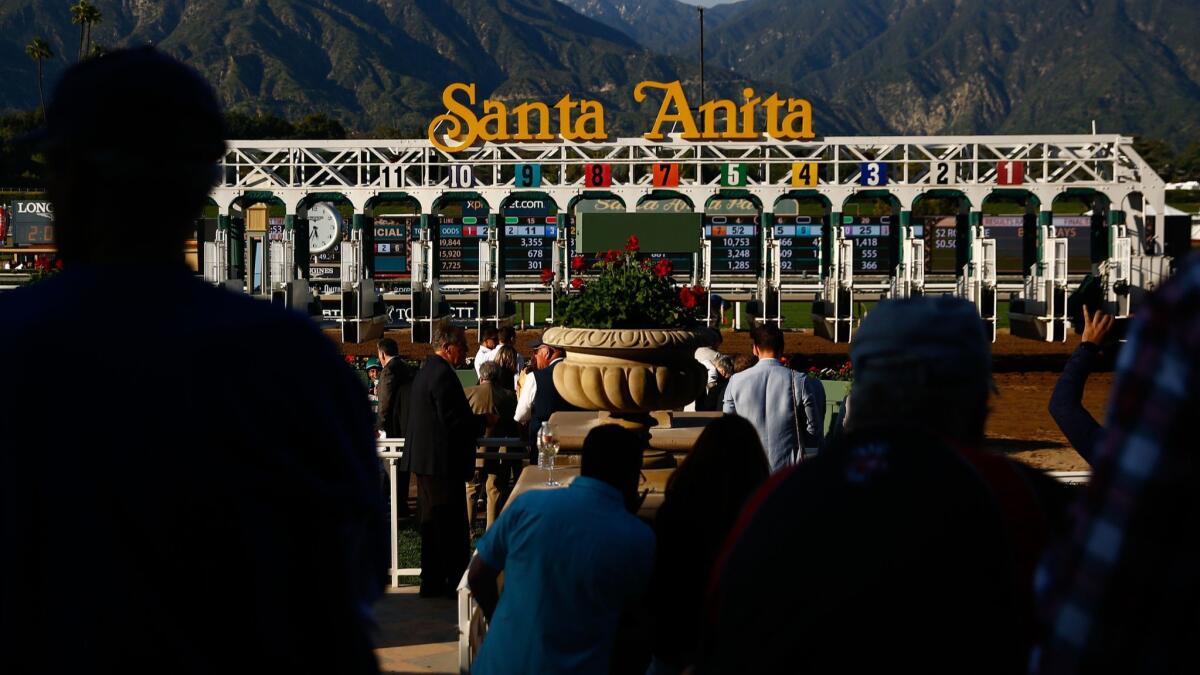Future of horse racing in California discussed at tension-filled meeting

- Share via
The agenda of the May meeting of the California Horse Racing Board was generally filled with routine procedural matters, leaving center stage to the heightened, and at times, hyperbolic rhetoric over what should be the future of horse racing in California.
The public comment part of Thursday’s meeting lasted almost 1 hour, 15 minutes with 21 people allowed up to three minutes each to speak their mind. Eleven of the people, including several self-proclaimed animal rights activists, made emotional appeals to end horse racing in the state, citing the 25 deaths that have occurred at Santa Anita since Dec. 26.
Ten speakers spoke on behalf of racing, often citing the care that thoroughbreds receive and newly instituted changes that are making the sport safer.
Tensions between the sides reached a peak when jockey Norberto Arroyo Jr., speaking in support of the industry, referred to the anti-horse racing speakers as a group of “single women.”
Nine of the 11 speaking in opposition of racing were women. Seven of the 10 speaking in favor of racing were men.
Another flashpoint in the discussion came when a speaker referred to Madeline Auerbach, CHRB vice-chair, as “unforgivingly ignorant.”
Several of the animal rights’ speakers mentioned California’s alleged complicity in allowing “horse slaughter” or selling horses for meat after their careers were over.
Chuck Winner, chairman of the CHRB, strongly pushed back, challenging anyone who had knowledge of a person brokering horses for slaughter to report them to the CHRB, where, if the claim had merit, the person would face felony charges.
The anti-horse racing speakers offered no evidence of current horse brokering in California, only citing historical information and saying that it exists.
Winner had to exert his authority as chair to bring civility to the meeting as he contested animal activists’ claims that people, such as himself, had profited greatly from horse racing and that taxpayers were financing the CHRB.
Sign up for our horse racing newsletter »
Winner said expenses in the sport are high and very few people make money. Rick Baedeker, executive director of the CHRB, explained that the money that runs the organization, while having to filter through a state agency, is all supplied from within the industry.
The 12 remaining items on the agenda were dispensed with in 48 minutes. It included the granting of a license to Los Alamitos (July 12-July 28) and Del Mar (July 17-Sept. 3).
There was an agenda item to discuss new rules regarding the use of Lasix, but it was pushed to another meeting. There was originally a committee meeting to discuss the issueon Wednesday, but it conflicted with a state assembly hearing on horse racing in Sacramento and was not held. Winner wanted a broad discussion of the issue and Thursday’s tense environment would have made that difficult.
Click here (or type in this url: lat.ms/2wVt90g) to sign up for our free horse racing newsletter.
More to Read
Go beyond the scoreboard
Get the latest on L.A.'s teams in the daily Sports Report newsletter.
You may occasionally receive promotional content from the Los Angeles Times.











